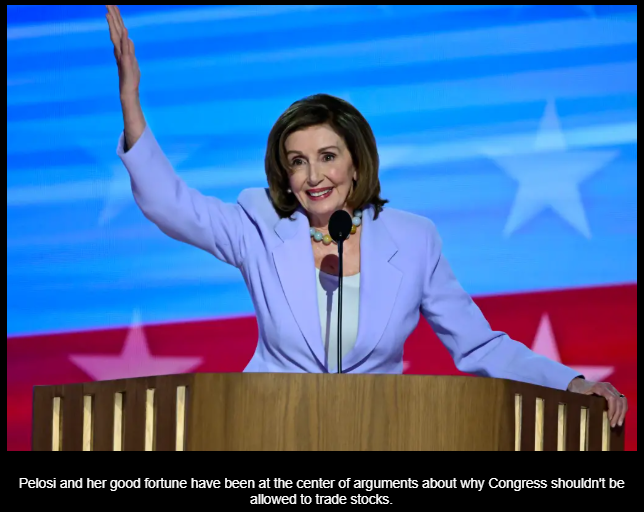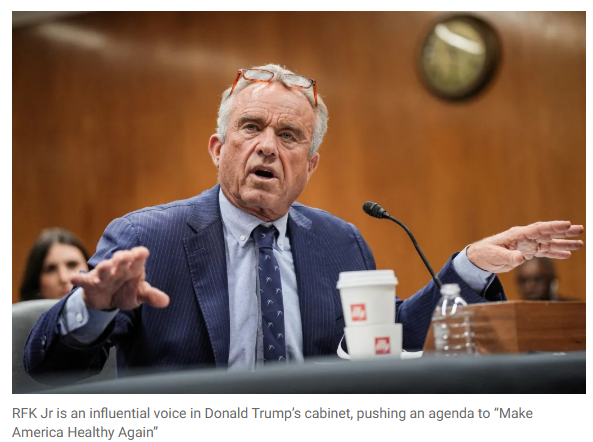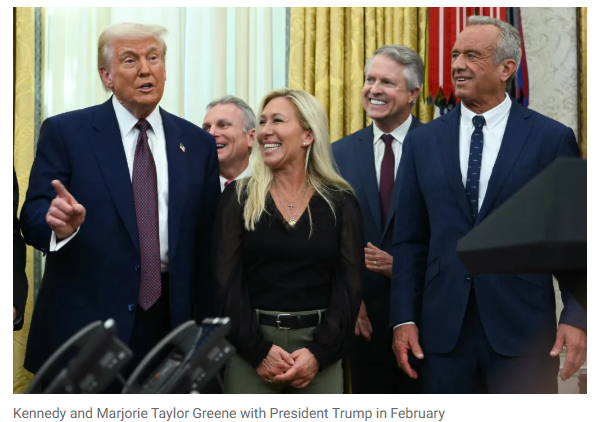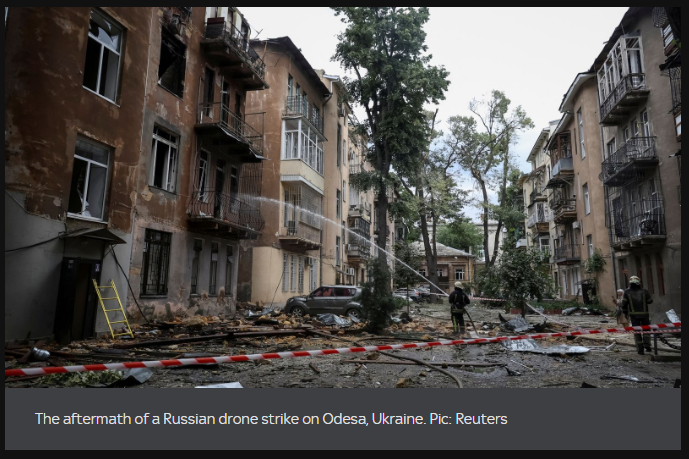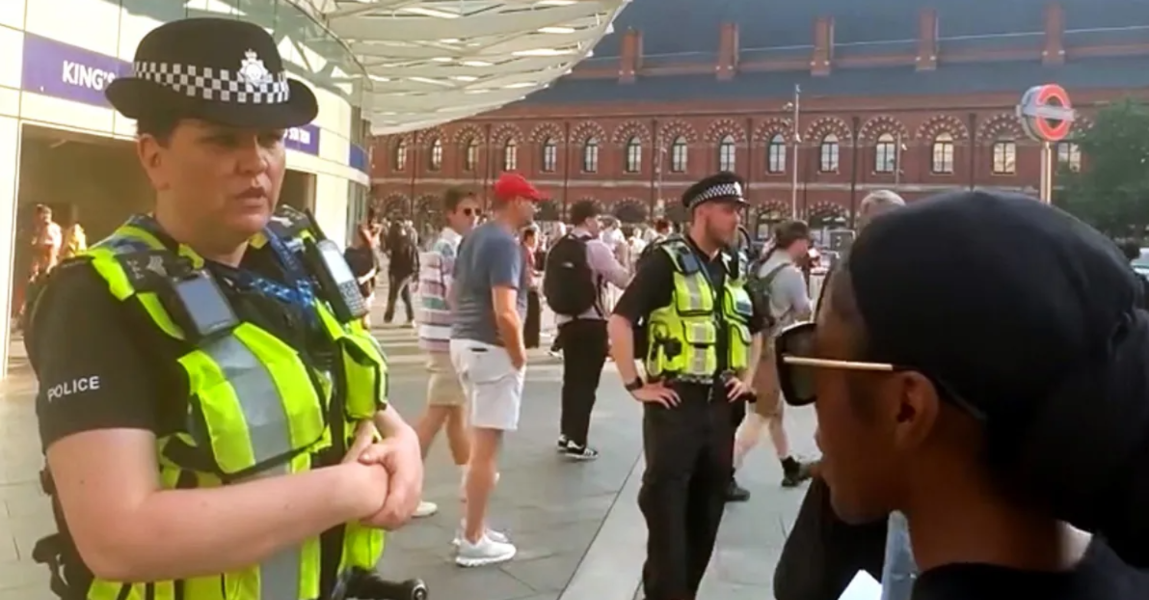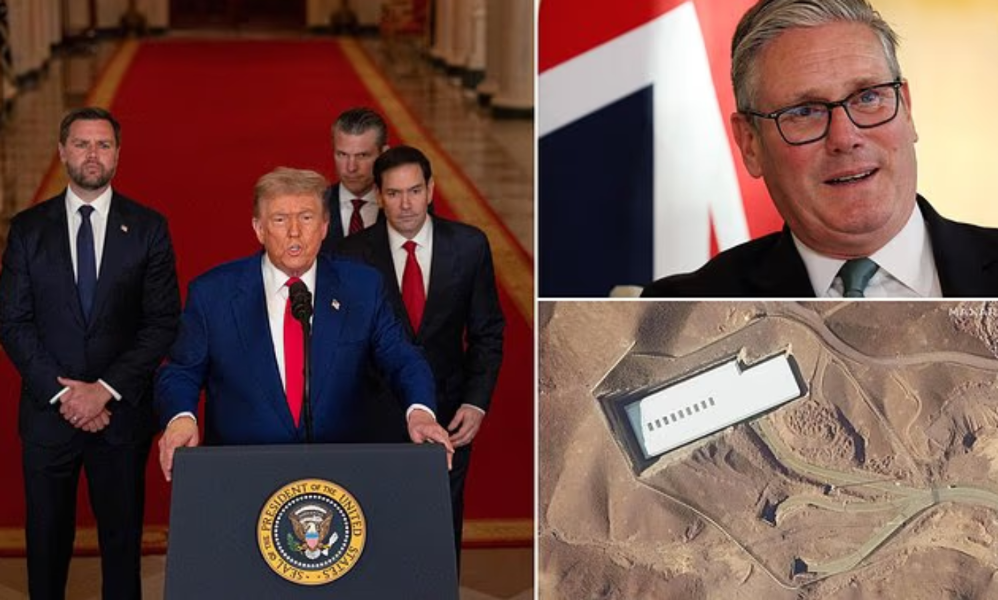-
Posts
10,807 -
Joined
-
Last visited
Content Type
Events
Forums
Downloads
Quizzes
Gallery
Blogs
Everything posted by Social Media
-

Donald J. Trump owns the USA - Iran war 100 percent
Social Media replied to Jingthing's topic in Political Soapbox
The OP has numerous specific claims that lack credible links. As per the Political Soap Box Rules: General approach and policy. We maintain a strict policy of accepting links or content only from mainstream and recognized media sources to ensure that information posted by members is both verifiable and trustworthy. We strive to remain impartial, prioritizing content that meets these standards and removing content that, in our opinion, does not. You can PM me those links and I will open the topic again, until then it will remain //closed// -
A misleading video making false claims from an unapproved source has been removed along with replies. Trump did not claim that he wants a regime change. Please view the direct source from Trump @frank83628 an unattributed image making numerous off topic claims has been removed. Responses to it also removed.
-

Politics Thaksin Plays Power Card to Keep Paetongtarn in Place
Social Media replied to webfact's topic in Thailand News
A link to a CONSPIRACY-PSEUDOSCIENCE website has been removed -
Nancy Pelosi’s Market Mastery: The Political Powerhouse Who Beat Wall Street at Its Own Game Nancy Pelosi, the longtime Democratic congresswoman from California, may be known for her legislative prowess, but recent financial disclosures suggest she and her husband, venture capitalist Paul Pelosi, have also become titans of the trading floor. In 2024 alone, the couple reported raking in between $7.8 million and $42.5 million — a windfall that could push their estimated net worth to a staggering $413 million. The precise number remains a mystery, as congressional disclosures only require reporting within ranges. Still, market analytics firm Quiver Quantitative, which tracks daily stock values, estimates their net worth at $257 million, up $26 million from 2023. But when factoring in the value of their non-market assets — a Napa Valley winery, stakes in a political consulting firm, and a Bay Area Italian restaurant — Pelosi’s fortune could stretch far beyond even that lofty estimate. A significant portion of their wealth can be attributed to Paul Pelosi’s deft stock moves. Though the trades are made under his name, Nancy Pelosi’s proximity to the corridors of power has long drawn scrutiny, prompting Missouri Republican Josh Hawley to name legislation aimed at banning congressional stock trading after her. Some of their 2024 trades raise eyebrows not only for their size but also for their timing. In July, the Pelosis sold 5,000 Microsoft shares for an estimated $2.2 million — just months before the Federal Trade Commission opened an antitrust investigation into the company. Similarly, they offloaded 2,000 Visa shares valued at $525,000 less than three months before the Department of Justice filed a monopoly lawsuit against the credit card giant. But their most lucrative move may have been a call option exercised in December. Originally bought in late 2023 for a premium of $1.8 million, the option gave them the right to buy 50,000 shares of NVIDIA — the chipmaker at the center of the AI boom — at just $12 each. That’s less than one-tenth the market price. The $2.4 million investment is now valued at over $7.2 million on paper. Their interest in AI didn’t stop there. In February 2024, the Pelosis paid between $600,000 and $1.25 million for call options on Palo Alto Networks, a California-based cybersecurity firm. This purchase came the same week lawmakers were briefed by the White House on a Russian national security threat. Palo Alto’s shares jumped nearly 20% shortly afterward, and by year’s end, the Pelosis had acquired 14,000 shares at $100 each — half the market value — resulting in a holding now worth about $2.8 million. It hasn’t all been smooth sailing. The couple took a hit in June when they dumped 2,500 Tesla shares, losing somewhere between $100,000 and $1 million on the sale. The loss, however, hardly dented their overall performance. Their investment portfolio ended 2024 with an estimated return of 54%, more than doubling the S&P 500’s 25% and outperforming every major hedge fund, according to Bloomberg’s year-end figures. The jaw-dropping returns come amid intensifying public pressure for legislation banning congressional stock trading, with critics pointing to potential conflicts of interest and privileged access to sensitive information. Pelosi has long opposed such a ban, saying, “we’re a free‑market economy.” Yet more recently, she has shown signs of softening her stance. In May, when asked whether Congress should implement such a ban, she replied, “If they do, they do.” A spokesperson defended her position, telling The Post, “Speaker Pelosi does not own any stocks, and she has no prior knowledge or subsequent involvement in any transactions.” Their 2025 portfolio is already gaining momentum. In January, the couple bought call options for Tempus AI, a then-obscure health tech firm that has since doubled in value following a $200 million partnership with AstraZeneca. They also invested in energy firm Vistra just before it announced a $1.9 billion acquisition of natural gas facilities, a move that sent its stock surging. Whether by prescience, shrewdness, or sheer luck, Nancy Pelosi’s financial record now outpaces even the savviest minds on Wall Street — earning her, in some circles, a new moniker: the She-Wolf of Capitol Hill. Adapted by ASEAN Now from NYP 2025-06-23
-
Fear, Firings, and Fallout: Inside RFK Jr’s Tumultuous Reign Over US Health Agencies At the Centers for Disease Control and Prevention (CDC) headquarters in Atlanta, Georgia, employees now whisper in soundproof rooms and scribble notes in paper notebooks to avoid detection. The fear of being watched is so intense that staff at Building 21 — once a hub of public health work — avoid Zoom calls entirely, terrified they’re being secretly recorded. This climate of paranoia and chaos, according to insiders, has emerged under the leadership of Robert F. Kennedy Jr., appointed Health Secretary in February. Since his arrival, more than 10,000 federal health workers — many with decades of experience — have been dismissed. "There is a constant sense that we’re being watched and monitored," said one global health specialist at the CDC. "Doge leadership are located several floors above but they have this omnipotent presence … We’re counted when we swipe our badges into the building." Doge refers to the Department of Government Efficiency, a newly empowered agency enforcing Kennedy’s agenda with unwavering oversight. Officials across the CDC, the Food and Drug Administration (FDA), and the National Institutes of Health (NIH) describe an administration bent on dismantling America’s health infrastructure in the name of reform. “RFK Jr is a disaster,” said a CDC grant specialist. “He is completely dismantling things to the point where the damage is going to become irreparable.” Kennedy’s supporters claim his goal is to eliminate inefficiency and restore public trust in health science. “Streamlining outdated programmes, ensuring fiscal discipline and demanding transparency are not attacks on science — they are a defence of it,” said Andrew Nixon, a spokesperson for the Department of Health and Human Services. “Secretary Kennedy remains committed to evidence-based leadership that serves the American people.” Yet inside the agencies, many see a different story unfolding. Longstanding research initiatives have been scrapped. Critical vaccine advisory panels have been gutted. Entire departments, such as the CDC’s childhood lead-poisoning prevention programme, have been closed, leaving states like Wisconsin unsupported during crises. Even the Prevention Research Centres, a network of hubs focused on chronic disease in low-income communities, faces termination. “He’s shooting himself in the foot,” said one recently fired CDC staffer. “What this administration is doing, whether it’s RFK, Trump or Doge, is so antithetical to my own values that I can’t work there any more.” Among the most controversial moves was Kennedy’s abrupt firing of all 17 members of the Advisory Committee on Immunization Practices. Dr. Charlotte Moser, one of those dismissed, said vaccines were being “politicised” under Kennedy. “My fear at this moment is for the health of the people of the United States if vaccines become less available,” she said. The decision to remove COVID-19 vaccines from recommendations for pregnant women and children, made without committee consultation, “does not align with the science,” she added. Dr. Yvonne Maldonado, another sacked committee member, echoed those fears. “The firings, disruption and the chaos of Kennedy’s administration are incredibly damaging,” she said. “I can’t think that these downstream impacts are going to be good ones.” Kennedy’s “Generation Gold Standard” — a $500 million initiative to develop vaccines using 1950s-era technology — has further baffled experts. An NIH source called it a “waste of money” and said Kennedy had bypassed traditional scientific review processes. “He’s dropping half a billion dollars on God knows what,” the source said. Inside the FDA, operations have ground down due to staff cuts. Project managers and administrators responsible for food safety inspections have been fired, forcing remaining inspectors to book travel on their personal credit cards — often waiting weeks for reimbursement. “As a result, things are going to slip and people will get sick,” warned an FDA official. Ironically, Kennedy’s Department of Government Efficiency is said to have added more red tape. “It’s the exact opposite of efficiency,” said a CDC grant specialist, citing new bureaucratic requirements for accessing approved funds. Many fired workers are awaiting court rulings on the legality of their dismissals, but few want to return. “There’s been a number of different steps that we could take to potentially get back into the agency and I haven’t taken any of them,” one said. As RFK Jr. presses on with his radical health agenda, confusion reigns. “It’s unclear to me how much RFK is actually in charge versus other Trump appointees, like [OMB director] Russell Vought,” said a CDC programme coordinator. “Kennedy clearly has certain ideas he’s interested in but at this point it seems more about cutting programmes than anything else.” Meanwhile, staff remaining at the CDC brace for what’s next. “There is no plan in place,” said the global health specialist. “This will have real consequences for people both here in America and overseas. It breaks my heart.” Adapted by ASEAN Now from The Times 2025-06-23
-
In just five years, Huda Ammori has steered Palestine Action from grassroots activism to the centre of a national security storm, with the group now under threat of being proscribed as a terrorist organisation. Her political awakening began in 2016 with an unexpected phone call from her Iraqi mother, urging her to join the Labour Party—an ironic suggestion, given the family’s bitterness over Tony Blair's role in the Iraq War. For activists like Ammori, the rise of Jeremy Corbyn sparked a renewed sense of possibility. “The renewal of hope was alive, with Jeremy Corbyn, a committed anti-imperialist activist and politician, elected as leader of the Labour Party,” she wrote in The New Arab in 2022. Under Corbyn, Labour seemed to offer an unprecedented opportunity to push for an arms embargo against Israel. “Many of us fought long and hard for [an arms embargo] by passing motions, speaking at Labour meetings, lobbying several MPs, and in 2018 the Labour conference voted to sanction and freeze all arms sales to and from Israel.” But Corbyn’s defeat in 2019 brought that momentum to a halt. “The options for implementing social and environmental justice through the political system were non-existent,” Ammori said. Out of that political void, she co-founded Palestine Action in 2020, an organisation inspired by the tactics of Extinction Rebellion. “From the black hole of politics, a new light through direct action and grassroots mobilisation took its place,” she wrote. For Ammori, the time for appealing to authority was over. “For me, the option is clear, my only regret is not seeing it sooner.” Since its founding, Palestine Action has claimed responsibility for over 300 incidents targeting British-based defence firms, universities, and government buildings. But the group escalated dramatically last week when two activists broke into RAF Brize Norton, Britain’s largest air base, and attacked two military aircraft with crowbars and red spray paint. Video footage showed them speeding across the runway on electric scooters, damaging engines on a Voyager jet—used to transport prime ministers and royalty—before disappearing without a trace. Counter-terrorism police are now leading the investigation, and Home Secretary Yvette Cooper is reportedly preparing to outlaw the group entirely. Ammori, 31, is the daughter of a Palestinian father and Iraqi mother. A former student of international business and finance at the University of Manchester, she co-founded the group with Richard Barnard, a 51-year-old former Extinction Rebellion member known for his radical politics and extensive tattoos, including slogans such as “freedom” in Arabic and “all cops are bastards.” Together, they built a movement that attracts artists, dancers, and students, many of whom have been jailed for their activism. One notable member, Audrey Xiarui Corno, a 22-year-old dancer, helped spray red paint across the Ministry of Defence in April 2024 and was arrested for occupying GRiD Defence Systems in June 2023. Released from prison earlier this month, she recently posted images of her supporters flipping off Aylesbury Crown Court. Despite mounting criticism, the group has not hidden its intentions. Its website once hosted an “Underground Manual,” offering step-by-step instructions on how to form cells, choose targets, and evade detection. “Making your job to pick one a slightly easier process!” it stated cheerfully. The manual included surveillance advice and stressed documenting each action. Then-policing minister Chris Philp called it a guide to “smash up businesses with sledgehammers,” and former government adviser Lord Walney labelled it a test case for law enforcement’s response to “pernicious militants.” Palestine Action’s rhetoric has grown sharper since the October 7 attacks. At a rally in November, Ammori declared: “We drive vans through their gates. We drive vans through their front doors. We occupy their rooms. We break inside and we destroy every single weapon.” She added, “Let me tell you, anyone who works at Elbit Systems they are also a target.” Though denounced by Labour leadership under Keir Starmer, the group retains ties to some Corbyn-era figures. In 2021, MPs Ian Byrne and John McDonnell appeared at events alongside Ammori. McDonnell later defended the group’s arrested activists as “young people… just starting out at university,” claiming they acted because others in politics had failed to do so. In a 2024 interview with New Left Review, Ammori spoke of the group’s long-term strategy: “By being security-conscious and working in small groups, we can make it difficult for the authorities to respond to individual actions by targeting the movement as a whole.” A statement sent by the group to The Telegraph read: “When our government fails to uphold their moral and legal obligations, it is the responsibility of ordinary citizens to take direct action. The terrorists are the ones committing a genocide, not those who break the tools used to commit it.” Critics argue otherwise. “Palestine Action has escalated from vandalising corporate property to targeting Jewish businesses and charities, and now sabotaging RAF aircraft,” said a spokesperson for the Campaign Against Antisemitism. “Their actions aren’t just intimidatory – they’re a direct assault on British values and democracy… There is no time to lose.” Related Topic: Watch: Activists Claim Damage to RAF Military Aircraft in Protest Against Gaza Operations Adapted by ASEAN Now from The Telegraph 2025-06-23
-
Putin Declares “Ukraine Is Ours” and Revives Nuclear Threats in Blunt Rebuke to Peace Hopes Russian President Vladimir Putin has made his most aggressive declaration on Ukraine in months, abandoning recent conciliatory tones and signaling an unwillingness to compromise—even as peace talks involving Donald Trump loom in the background. Speaking at the St. Petersburg International Economic Forum, a high-profile investment gathering, Putin stunned attendees with a hardline vision for the war in Ukraine. When asked what he considered the endgame for the conflict, he answered bluntly: “I have said many times that I consider the Russian and Ukrainian people to be one nation. In this sense, all of Ukraine is ours.” The comment drew raucous applause from an audience packed with loyal politicians and business elites. But the Russian leader didn’t stop there. “There is an old rule,” he added. “‘Where a Russian soldier sets foot, that is ours’.” With those words, Putin appeared to reaffirm a maximalist vision of territorial conquest, one far more sweeping than the partial annexations or negotiated settlements that have been floated in diplomatic channels. His remarks mark a sharp departure from recent Kremlin messaging, which had grown notably softer since Donald Trump began promoting the idea of a U.S.-brokered peace deal. For months, Russian officials had adopted a more measured tone, presumably to position themselves as open to a negotiated solution. But that posture was absent in St. Petersburg. Instead, Putin returned to the aggressive rhetoric that dominated much of the early war period. Most concerning to many observers was the Russian president’s renewed invocation of nuclear threats. Asked how Moscow would respond if Ukraine used a “dirty bomb” against Russian forces, Putin’s reply was chillingly direct. “This would be a colossal mistake on the part of those whom we call neo-Nazis on the territory of today’s Ukraine,” he said. “It could be their last mistake.” He continued, “We always respond and respond in kind. Therefore, our response will be very tough.” Such nuclear threats had been a near-weekly fixture of Kremlin communication during the final stretch of Joe Biden’s presidency, but they largely receded when Trump assumed office. Putin’s decision to bring them back now is widely seen as a calculated move, one meant to signal that Russia remains unbowed—not just militarily, but ideologically. Analysts suggest this rhetorical shift is more than just bluster. It may reflect deep skepticism within the Kremlin over the utility of peace talks and a desire to reassert dominance on both the battlefield and the geopolitical stage. The timing is also telling. With Trump attempting to cast himself as a potential peace-broker, Putin’s words seem to suggest that Moscow does not intend to accept any compromise that falls short of its expansive territorial ambitions. In essence, the message to Washington and Kyiv alike is that Russia's objectives remain unchanged—and uncompromising. Whether this signals a coming escalation or is intended to shape the contours of any future negotiations remains to be seen. But for now, Vladimir Putin has made it abundantly clear: he believes all of Ukraine belongs to Russia, and he is prepared to back that claim with the threat of catastrophic force. Adapted by ASEAN Now from Sky News 2025-06-23
-
"Preachers Confronted by Police at King’s Cross: ‘I Just Think It’s Wrong’" A video capturing the tense moment a British Transport Police officer told a group of Christian evangelists to stop preaching outside King’s Cross station has sparked widespread debate over freedom of religious expression in public spaces. The short clip, which has since gone viral, shows a female police officer confronting members of Mad 4 Jesus Ministries and expressing her personal disapproval of their public gospel preaching. "It’s so loud," she tells the preachers. "These people just want to do their journey, they’re not coming here to listen to you." When the preacher challenges her, asking, "If I was doing a happy, clappy song it would be ok?" she bluntly replies, "I just think it’s all wrong," before walking away. The confrontation occurred on the busy concourse between King’s Cross and St Pancras International stations—two of London’s largest transit hubs that see nearly 60 million passengers annually. According to Mon B, who leads the Mad 4 Jesus Ministries group, they had been told not to stand in front of the station barriers before being confronted by the officer. Mon B described the officer's remarks as an "unnecessary" expression of personal opinion. This incident is the latest in a string of controversies involving police officers and Christian street preachers in London. Last year, Christian singer Harmonie London was told to stop performing church songs outside a church’s grounds, leading to a formal apology from the Metropolitan Police. Harmonie, then 20, said she felt “humiliated,” “sad,” and “bullied” after the confrontation, during which volunteer officer Maya Hadzhipetkova threatened to confiscate her instruments following her rendition of Amazing Grace. The Met later admitted the officer was wrong to state that church songs could not be performed outside church property and clarified that the issue had been about unlicensed busking, not the content of her songs. Responding to the latest King's Cross video, members of the public expressed outrage. One commenter asked, “I’m sorry, is this officer paid to give out her opinions? Or is she paid to protect the public?” Another wrote, “You are not breaking the law. She should be out catching criminals not bothering you.” A third added, “Luckily you’re not paid for your opinions. You’re paid to do your job and stopping peaceful preachers is not part of it.” Mon B later shared a more positive interaction with a second officer from the same patrol, during which they reportedly prayed together. A video shows the second officer nodding and appearing to thank the group after the prayer session. Additional footage from the same location shows the group performing a Christian song titled Yeshua, originally released by Jesus Image in 2022, using a loudspeaker while commuters pass by without incident. The British Transport Police addressed the incident in a statement explaining: “Officers were on patrol at the station when they came across a group preaching on private land with a loud speaker which requires permission from Network Rail, and as such they asked them to leave. We fully appreciate anyone’s right for religious expression, and the incident in full is currently being reviewed by a senior officer.” In a separate incident earlier last year, Metropolitan Police officers threatened to arrest a preacher for allegedly making homophobic remarks during a gospel message on Uxbridge High Street. Although the officers stated they had not personally witnessed the alleged offense, they warned the preacher he could be arrested for failing to provide his name due to the public complaint. One officer said, “If I do walk away and I see offences, and the victim wants to press charges... I could have failed a potential victim.” Another added, “Provide me your name now or you will be arrested. You can spend the night in a cell and we can do it that way.” The missionaries defended their message, citing John 3:16 and asserting their right to religious expression. “We’re just passionate,” one preacher said when accused of being emotional. The officers insisted they were not attacking the group, but the exchange highlighted a growing tension between public religious activity and modern policing approaches in London. Adapted by ASEAN Now from The Standard 2025-06-23
-
Mark Zuckerberg’s Political Rebrand Reveals a Long-Held Persona, Say Insiders Mark Zuckerberg’s recent public pivot toward conservative politics and overt support for President Donald Trump has sparked widespread debate — but according to dozens of people who have worked closely with the Meta CEO, the move is far from surprising. Rather than a dramatic political about-face, insiders say it’s simply the Facebook founder dropping the act and revealing a version of himself that’s long existed just beneath the surface. “Mark was trying to keep his real feelings tight inside and put on a suit and cut his hair and be a good boy. But the whole time this was all one inch underneath,” one Meta insider told the Financial Times. “Then he said, ‘F*** it. I might as well be the person I really am.’” Since Trump’s election in November, Zuckerberg has increasingly aligned himself with the former president. According to reports, he has met with Trump at Mar-a-Lago, donated $1 million to Trump’s inaugural fund, attended the inauguration, and even co-hosted a reception. Behind the scenes, Meta has also implemented policy changes that reflect a closer alignment with the Trump administration’s worldview. Andrew Bosworth, Meta’s Chief Technology Officer, said that what the public is only now beginning to perceive has long been apparent internally. “The public is seeing him more how we have, internally, since the beginning,” Bosworth told the Financial Times. He also suggested that Zuckerberg’s earlier public persona—marked by buttoned-up appearances and deferential attitudes toward government regulators—was a performance more than a conviction. “He thought he was supposed to be doing that,” Bosworth added. Meta declined to comment for the story, and the White House has yet to respond to inquiries. Zuckerberg’s ideological evolution appears to have been gradual, largely influenced by years of criticism and regulatory pressure. Tensions peaked during the early stages of the Biden administration, when officials urged Facebook—Meta’s former name—to moderate content about COVID-19, particularly misinformation. Zuckerberg complied at the time but reportedly came to regret the decision. In contrast, his posture under the Trump administration has been notably more resistant to appeasement. The shift also coincides with a more visible embrace of what Zuckerberg himself calls “masculine energy.” Speaking on the Joe Rogan Experience, he said, “Masculine energy is good.” Even when Meta executives privately pushed back on the comment, Zuckerberg stood by it without apology. Those familiar with Zuckerberg suggest that his newfound embrace of conservative values and masculine aesthetics—evident in his interest in Brazilian jiu-jitsu, his switch to casual streetwear, and a more assertive public tone—is part of a broader rebranding effort aimed at boosting his personal appeal. “He saw that Elon Musk was popular among the tech bros,” a former Meta insider said. “There was a push to make him cool. The core of The Social Network movie is true — he just wants people to like him.” Whether the public will embrace this “authentic” version of Zuckerberg remains to be seen, but to those on the inside, it’s not a transformation. It’s a long-restrained identity finally being unmasked. Adapted by ASEAN Now from The Independent 2025-06-23
-
A growing divide in housing provision is fuelling claims that Britain prioritises asylum seekers over its own homeless citizens. An investigation has revealed that 17 councils across England are accommodating up to ten times more asylum seekers than homeless households, prompting public outrage and political criticism. The starkest disparity has been found in Pendle, a borough recently won by Reform UK in Lancashire, where 453 asylum seekers are reportedly being housed, compared to just nine homeless households in temporary accommodation. Other areas with similar discrepancies include Stockton-on-Tees, which hosts 797 asylum seekers against 26 homeless households, and Wyre, with 375 versus 14. Critics argue these numbers expose a deeply unfair system. Robert Bates of the Centre for Migration Control stated, “Those who were born here and have contributed to the economy have been abandoned, and left on the streets, in favour of undocumented young men towards whom we should have no moral or legal obligation. Thousands of British veterans and families are facing real hardship but are denied even a fraction of the generosity extended to asylum seekers.” He added, “Scattering these people across the country places further strain on communities suffering with a dysfunctional housing market, increasing rents and making it harder for young people to own a home. Anyone entering the country illegally should be detained and swiftly deported—it is only then that we can hope this madness will end.” While critics cite inequality, officials argue the comparison itself is flawed. A Government spokesperson said: “This analysis is incorrect and misleading as it compares the number of individual asylum seekers with homeless households, which can contain more than one person.” The Home Office is legally required to house asylum seekers awaiting a decision on their claim. If successful, they are granted refugee status and entitled to work, claim benefits, and seek housing through local councils—subject to a priority system based on vulnerability and need. However, officials emphasise that councils cannot control where homeless individuals choose to reside, and asylum housing is assigned based on national dispersal systems. Yet the optics remain jarring. In Coventry—home to one of the country’s highest asylum seeker populations—locals expressed their frustration. Louise, 37, said: “I'm currently homeless. The houses go to the asylum seekers rather than the actual homeless. I'm in a shared accommodation and I am technically homeless. I think the Government should be looking after their own before helping other people.” Dee, 38, added, “I think it's ridiculous that asylum seekers can come over here and get housed but my husband, who has paid taxes his whole life, is on the street. I don't think we can handle the numbers, we can't house the people who are from this city.” The cost of accommodating asylum seekers has ballooned, now reaching £4.2 million a day. About 30,000 remain in hotels, receiving meals and an allowance of £8.86 per week—or £49.18 if meals aren't provided. They also receive free NHS care, prescriptions, dental services, and school access for their children. The issue is further complicated by the fact that many newly recognised refugees also fall into homelessness. The No Accommodation Network (Naccom) reported a doubling of refugee homelessness in the past year, citing nearly 2,000 cases—the highest they’ve ever recorded. Once refugee status is granted, individuals have just 56 days to vacate asylum housing and find accommodation on their own. Alp Mehmet of Migration Watch UK highlighted the broader picture: “Over 100,000 people applied for asylum in 2024, including main applicants and their dependants. There will be just as many seeking asylum this year. Then there’s the 430,000 net migration added to the population last year. Well over half a million people needing a roof over their heads, roofs that won’t be available to British citizens. When will the Government see sense and end this madness? Get a grip, Sir Keir!” The Government says it is responding, noting increased asylum decision rates, £1 billion allocated to homelessness services, and an effort to stop using hotels for asylum seekers within four years. Yet, with public frustration mounting—as evidenced by protests and polling showing 68% believe asylum numbers are too high—the pressure on Westminster to resolve the housing crisis for all remains as urgent as ever. Adapted by ASEAN Now from Daily Mail 2025-06-23
-
Pentagon: ‘Bold and Brilliant’ Operation That Crippled Iran’s Nuclear Infrastructure” The Pentagon has declared a high-stakes overnight strike on Iran’s nuclear facilities a decisive success, describing it as a “bold and brilliant” operation that inflicted massive damage without harming civilians or military personnel. US Defense Secretary Pete Hegseth opened the briefing by emphasizing the mission’s primary aim: to “degrade” and “destroy” Iran’s nuclear capabilities. “This was a highly classified mission with very few people in Washington knowing the timing or nature of this plan,” Hegseth explained, calling the execution a testament to the precision and secrecy of the US military. Directing reporters to a large screen, Air Force General Dan Caine of the Joint Chiefs of Staff provided detailed insights into the timeline and logistics of the strike. According to Caine, the attack began when seven B-2 bombers undertook an 18-hour flight. At roughly 17:00 local time (22:00 BST), a US submarine launched more than two dozen Tomahawk cruise missiles targeting key nuclear infrastructure at the Isfahan site. Strikes on all three designated targets—Fordo, Natanz, and Isfahan—occurred between 18:40 and 19:05 Eastern Time. “It appears that Iran's surface-to-air missile systems did not see us,” said Caine. “We are not aware of any shots fired at our aircraft during egress.” He further revealed that the final Tomahawk strike was timed to ensure the US retained “the element of surprise.” General Caine said that the mission involved the “largest B-2 operational strike in US history,” and preliminary assessments showed “extremely severe damage and destruction” to all targeted nuclear facilities. “Final battle damage will take some time,” he noted, “but an initial battle damage assessment indicates all three sites sustained extremely severe damage.” Hegseth echoed the assessment, stating: “All of our precision munitions struck where we wanted them to strike and had the desired effect.” He confirmed that the attack specifically avoided military personnel and civilians, reiterating, “This mission was not and has not been about regime change.” With US forces on “high alert” following the operation, Hegseth issued a stern warning to Tehran. “Any retaliation would be an incredibly poor choice,” he said. Asked whether there had been a definitive moment when President Donald Trump decided to authorize the operation, Hegseth said Trump had been “fully committed to the peace process” but was repeatedly met with “stonewalling” from Iran. “There was no particular moment for Trump,” he said. “But there was a moment where he realised there was a time when action needed to be taken to minimise the threat.” Hegseth further stressed that Washington had not closed the door on diplomacy. “They know precisely what the American position is, what steps they can take to allow for peace, and I hope they do so.” During the Pentagon’s briefing, Vice-President JD Vance echoed the administration’s stance in an interview with NBC News. “The United States is not at war with Iran,” he stated. “We are at war with its nuclear ambitions.” Vance affirmed that the US believes it has “destroyed” Iran’s nuclear programme and rejected suggestions that the operation fell outside President Trump’s authority. “It’s not true,” he said, responding to criticism from Democratic House Leader Hakeem Jeffries. Caine also disclosed that a total of 75 precision-guided munitions were used in the strike, including 14 Massive Ordnance Penetrators—commonly known as “bunker busters.” Some bombers were dispatched westward into the Pacific as a decoy to divert attention and mask the real target. “The president has authorised a precision operation to neutralise the threats to our national interests posed by the Iranian nuclear programme and the collective self defence of our troops and our ally, Israel,” Hegseth concluded. “We devastated the Iranian nuclear programme, but it's worth noting the operation did not target Iranian troops or the Iranian people.” As the bombers return home, the Pentagon continues its assessment of the operation’s long-term impact, but early signs indicate the mission achieved its core objective: a crippling blow to Iran’s nuclear ambitions. Adapted by ASEAN Now from BBC 2025-06-23
- 122 replies
-
- 15
-

-

-

-

-
UPDATE: Starmer Supports Trump’s Strike on Iran, Calling Nuclear Threat “Grave to Global Security” Starmer Supports Trump’s Strike on Iran, Calling Nuclear Threat “Grave to Global Security” Prime Minister Keir Starmer has offered Britain’s full support for the surprise US airstrikes on Iran’s nuclear facilities, declaring that Tehran’s pursuit of nuclear weapons represents “a grave threat to international security.” His endorsement came just hours after President Donald Trump confirmed that US forces had bombed three Iranian nuclear sites, including the heavily fortified Fordow facility. In a statement released early this morning, Starmer said, “Iran's nuclear programme is a grave threat to international security. Iran can never be allowed to develop a nuclear weapon and the US has taken action to alleviate that threat. The situation in the Middle East remains volatile and stability in the region is a priority. We call on Iran to return to the negotiating table and reach a diplomatic solution to end this crisis.” The Fordow site, located roughly 80 miles south of Tehran and buried deep within a mountain, was reportedly hit with a 30,000-pound “bunker buster” bomb. The US also launched Tomahawk cruise missiles from submarines targeting other key nuclear facilities at Natanz and Isfahan. Trump described the strikes as a “spectacular military success” during a late-night address from the White House, claiming that the uranium enrichment base at Fordow had been “flattened.” According to reports from US defense sources, the bombers used in the strike flew directly from the United States rather than operating from the joint UK/US base at Diego Garcia in the Indian Ocean. While the UK was not directly involved in the operation, Business Secretary Jonathan Reynolds confirmed that Britain was informed ahead of time. The Prime Minister’s endorsement of US military action marks a notable shift, as Starmer had previously urged caution and emphasized the need for diplomatic solutions to avoid escalating tensions across the Middle East. However, following the strikes, he has publicly recognized the US’s actions as a necessary step to curb Iran’s nuclear ambitions. Support for the US strikes extended beyond the government benches. Opposition leader Kemi Badenoch said, “By targeting Iran’s nuclear sites, the US has taken decisive action against a regime that fuels global terror and directly threatens the UK. Iranian operatives have plotted murders and attacks on British soil. We should stand firmly with the US and Israel.” Reform UK leader Nigel Farage also endorsed the airstrikes, posting on social media: “Iran must not be allowed to have nuclear weapons, the future of Israel depends on it.” The international fallout from the operation remains uncertain, but the political response in the UK has been overwhelmingly in favor of the strikes. With tensions in the Middle East already dangerously high, the backing of America’s actions by the UK’s political establishment signals a rare moment of unity in confronting what many see as a defining threat to global stability. Adapted by ASEAN Now from Daily Mail 2025-06-22
-

USA Trump to make decision on US involvement 'within two weeks'
Social Media replied to Social Media's topic in World News
New Topic: -
Thank you, the topic is now in the world news, please continue there: //closed//






